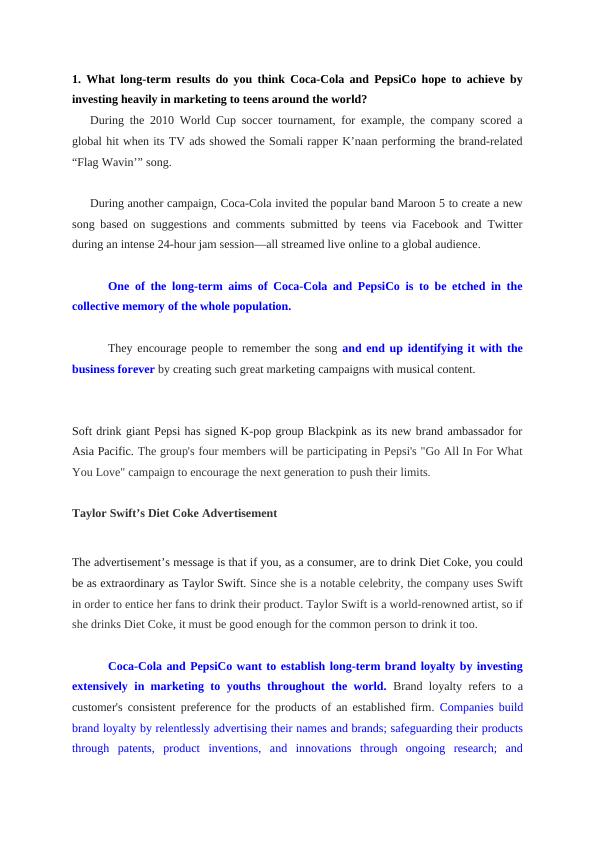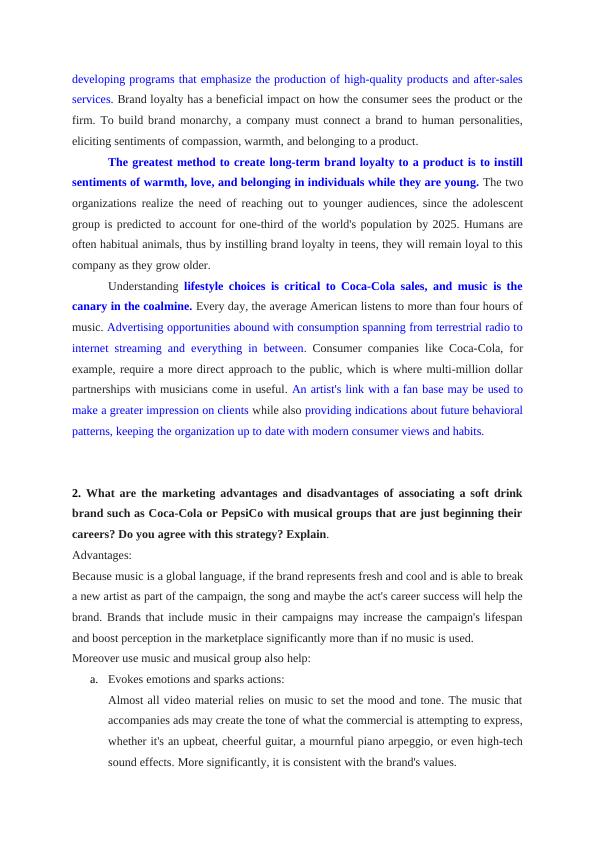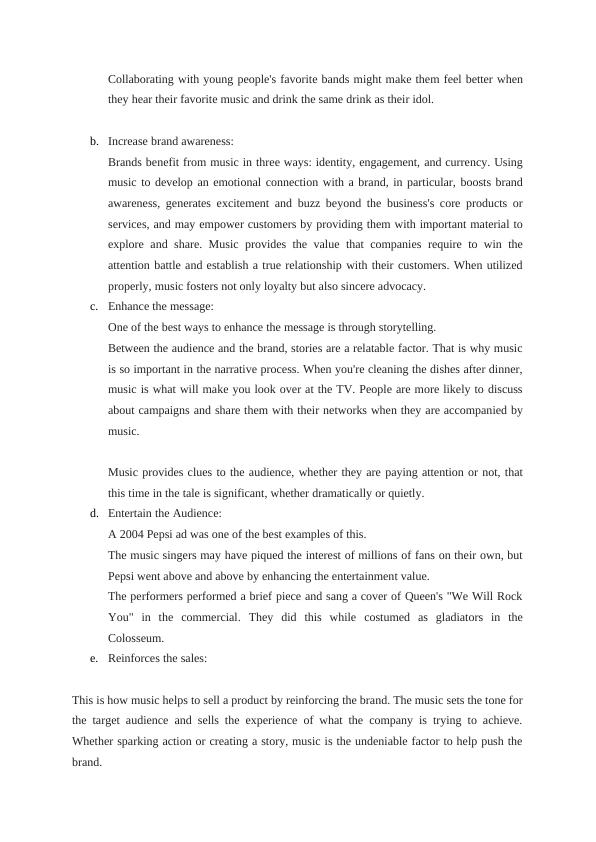Coca-Cola and PepsiCo's Marketing Strategies with Music and Emerging Performers
Added on 2022-10-31
6 Pages2116 Words165 Views
1. What long-term results do you think Coca-Cola and PepsiCo hope to achieve by
investing heavily in marketing to teens around the world?
During the 2010 World Cup soccer tournament, for example, the company scored a
global hit when its TV ads showed the Somali rapper K’naan performing the brand-related
“Flag Wavin’” song.
During another campaign, Coca-Cola invited the popular band Maroon 5 to create a new
song based on suggestions and comments submitted by teens via Facebook and Twitter
during an intense 24-hour jam session—all streamed live online to a global audience.
One of the long-term aims of Coca-Cola and PepsiCo is to be etched in the
collective memory of the whole population.
They encourage people to remember the song and end up identifying it with the
business forever by creating such great marketing campaigns with musical content.
Soft drink giant Pepsi has signed K-pop group Blackpink as its new brand ambassador for
Asia Pacific. The group's four members will be participating in Pepsi's "Go All In For What
You Love" campaign to encourage the next generation to push their limits.
Taylor Swift’s Diet Coke Advertisement
The advertisement’s message is that if you, as a consumer, are to drink Diet Coke, you could
be as extraordinary as Taylor Swift. Since she is a notable celebrity, the company uses Swift
in order to entice her fans to drink their product. Taylor Swift is a world-renowned artist, so if
she drinks Diet Coke, it must be good enough for the common person to drink it too.
Coca-Cola and PepsiCo want to establish long-term brand loyalty by investing
extensively in marketing to youths throughout the world. Brand loyalty refers to a
customer's consistent preference for the products of an established firm. Companies build
brand loyalty by relentlessly advertising their names and brands; safeguarding their products
through patents, product inventions, and innovations through ongoing research; and
investing heavily in marketing to teens around the world?
During the 2010 World Cup soccer tournament, for example, the company scored a
global hit when its TV ads showed the Somali rapper K’naan performing the brand-related
“Flag Wavin’” song.
During another campaign, Coca-Cola invited the popular band Maroon 5 to create a new
song based on suggestions and comments submitted by teens via Facebook and Twitter
during an intense 24-hour jam session—all streamed live online to a global audience.
One of the long-term aims of Coca-Cola and PepsiCo is to be etched in the
collective memory of the whole population.
They encourage people to remember the song and end up identifying it with the
business forever by creating such great marketing campaigns with musical content.
Soft drink giant Pepsi has signed K-pop group Blackpink as its new brand ambassador for
Asia Pacific. The group's four members will be participating in Pepsi's "Go All In For What
You Love" campaign to encourage the next generation to push their limits.
Taylor Swift’s Diet Coke Advertisement
The advertisement’s message is that if you, as a consumer, are to drink Diet Coke, you could
be as extraordinary as Taylor Swift. Since she is a notable celebrity, the company uses Swift
in order to entice her fans to drink their product. Taylor Swift is a world-renowned artist, so if
she drinks Diet Coke, it must be good enough for the common person to drink it too.
Coca-Cola and PepsiCo want to establish long-term brand loyalty by investing
extensively in marketing to youths throughout the world. Brand loyalty refers to a
customer's consistent preference for the products of an established firm. Companies build
brand loyalty by relentlessly advertising their names and brands; safeguarding their products
through patents, product inventions, and innovations through ongoing research; and

developing programs that emphasize the production of high-quality products and after-sales
services. Brand loyalty has a beneficial impact on how the consumer sees the product or the
firm. To build brand monarchy, a company must connect a brand to human personalities,
eliciting sentiments of compassion, warmth, and belonging to a product.
The greatest method to create long-term brand loyalty to a product is to instill
sentiments of warmth, love, and belonging in individuals while they are young. The two
organizations realize the need of reaching out to younger audiences, since the adolescent
group is predicted to account for one-third of the world's population by 2025. Humans are
often habitual animals, thus by instilling brand loyalty in teens, they will remain loyal to this
company as they grow older.
Understanding lifestyle choices is critical to Coca-Cola sales, and music is the
canary in the coalmine. Every day, the average American listens to more than four hours of
music. Advertising opportunities abound with consumption spanning from terrestrial radio to
internet streaming and everything in between. Consumer companies like Coca-Cola, for
example, require a more direct approach to the public, which is where multi-million dollar
partnerships with musicians come in useful. An artist's link with a fan base may be used to
make a greater impression on clients while also providing indications about future behavioral
patterns, keeping the organization up to date with modern consumer views and habits.
2. What are the marketing advantages and disadvantages of associating a soft drink
brand such as Coca-Cola or PepsiCo with musical groups that are just beginning their
careers? Do you agree with this strategy? Explain.
Advantages:
Because music is a global language, if the brand represents fresh and cool and is able to break
a new artist as part of the campaign, the song and maybe the act's career success will help the
brand. Brands that include music in their campaigns may increase the campaign's lifespan
and boost perception in the marketplace significantly more than if no music is used.
Moreover use music and musical group also help:
a. Evokes emotions and sparks actions:
Almost all video material relies on music to set the mood and tone. The music that
accompanies ads may create the tone of what the commercial is attempting to express,
whether it's an upbeat, cheerful guitar, a mournful piano arpeggio, or even high-tech
sound effects. More significantly, it is consistent with the brand's values.
services. Brand loyalty has a beneficial impact on how the consumer sees the product or the
firm. To build brand monarchy, a company must connect a brand to human personalities,
eliciting sentiments of compassion, warmth, and belonging to a product.
The greatest method to create long-term brand loyalty to a product is to instill
sentiments of warmth, love, and belonging in individuals while they are young. The two
organizations realize the need of reaching out to younger audiences, since the adolescent
group is predicted to account for one-third of the world's population by 2025. Humans are
often habitual animals, thus by instilling brand loyalty in teens, they will remain loyal to this
company as they grow older.
Understanding lifestyle choices is critical to Coca-Cola sales, and music is the
canary in the coalmine. Every day, the average American listens to more than four hours of
music. Advertising opportunities abound with consumption spanning from terrestrial radio to
internet streaming and everything in between. Consumer companies like Coca-Cola, for
example, require a more direct approach to the public, which is where multi-million dollar
partnerships with musicians come in useful. An artist's link with a fan base may be used to
make a greater impression on clients while also providing indications about future behavioral
patterns, keeping the organization up to date with modern consumer views and habits.
2. What are the marketing advantages and disadvantages of associating a soft drink
brand such as Coca-Cola or PepsiCo with musical groups that are just beginning their
careers? Do you agree with this strategy? Explain.
Advantages:
Because music is a global language, if the brand represents fresh and cool and is able to break
a new artist as part of the campaign, the song and maybe the act's career success will help the
brand. Brands that include music in their campaigns may increase the campaign's lifespan
and boost perception in the marketplace significantly more than if no music is used.
Moreover use music and musical group also help:
a. Evokes emotions and sparks actions:
Almost all video material relies on music to set the mood and tone. The music that
accompanies ads may create the tone of what the commercial is attempting to express,
whether it's an upbeat, cheerful guitar, a mournful piano arpeggio, or even high-tech
sound effects. More significantly, it is consistent with the brand's values.

Collaborating with young people's favorite bands might make them feel better when
they hear their favorite music and drink the same drink as their idol.
b. Increase brand awareness:
Brands benefit from music in three ways: identity, engagement, and currency. Using
music to develop an emotional connection with a brand, in particular, boosts brand
awareness, generates excitement and buzz beyond the business's core products or
services, and may empower customers by providing them with important material to
explore and share. Music provides the value that companies require to win the
attention battle and establish a true relationship with their customers. When utilized
properly, music fosters not only loyalty but also sincere advocacy.
c. Enhance the message:
One of the best ways to enhance the message is through storytelling.
Between the audience and the brand, stories are a relatable factor. That is why music
is so important in the narrative process. When you're cleaning the dishes after dinner,
music is what will make you look over at the TV. People are more likely to discuss
about campaigns and share them with their networks when they are accompanied by
music.
Music provides clues to the audience, whether they are paying attention or not, that
this time in the tale is significant, whether dramatically or quietly.
d. Entertain the Audience:
A 2004 Pepsi ad was one of the best examples of this.
The music singers may have piqued the interest of millions of fans on their own, but
Pepsi went above and above by enhancing the entertainment value.
The performers performed a brief piece and sang a cover of Queen's "We Will Rock
You" in the commercial. They did this while costumed as gladiators in the
Colosseum.
e. Reinforces the sales:
This is how music helps to sell a product by reinforcing the brand. The music sets the tone for
the target audience and sells the experience of what the company is trying to achieve.
Whether sparking action or creating a story, music is the undeniable factor to help push the
brand.
they hear their favorite music and drink the same drink as their idol.
b. Increase brand awareness:
Brands benefit from music in three ways: identity, engagement, and currency. Using
music to develop an emotional connection with a brand, in particular, boosts brand
awareness, generates excitement and buzz beyond the business's core products or
services, and may empower customers by providing them with important material to
explore and share. Music provides the value that companies require to win the
attention battle and establish a true relationship with their customers. When utilized
properly, music fosters not only loyalty but also sincere advocacy.
c. Enhance the message:
One of the best ways to enhance the message is through storytelling.
Between the audience and the brand, stories are a relatable factor. That is why music
is so important in the narrative process. When you're cleaning the dishes after dinner,
music is what will make you look over at the TV. People are more likely to discuss
about campaigns and share them with their networks when they are accompanied by
music.
Music provides clues to the audience, whether they are paying attention or not, that
this time in the tale is significant, whether dramatically or quietly.
d. Entertain the Audience:
A 2004 Pepsi ad was one of the best examples of this.
The music singers may have piqued the interest of millions of fans on their own, but
Pepsi went above and above by enhancing the entertainment value.
The performers performed a brief piece and sang a cover of Queen's "We Will Rock
You" in the commercial. They did this while costumed as gladiators in the
Colosseum.
e. Reinforces the sales:
This is how music helps to sell a product by reinforcing the brand. The music sets the tone for
the target audience and sells the experience of what the company is trying to achieve.
Whether sparking action or creating a story, music is the undeniable factor to help push the
brand.

End of preview
Want to access all the pages? Upload your documents or become a member.
Related Documents
Marketing Communication of Coca Colalg...
|10
|2899
|59
Marketing Plan of Diet Pepsi USlg...
|15
|2592
|167
Brand Analysis of Coca Colalg...
|11
|1919
|442
MARKETING PLAN OF PRODUCT LIKE COCA COLAlg...
|7
|472
|12
Marketing Mix Strategies of Coca Cola and PepsiColg...
|10
|1670
|189
Evaluate and Produce Market Planlg...
|11
|1043
|69
